By: debbie lynn elias
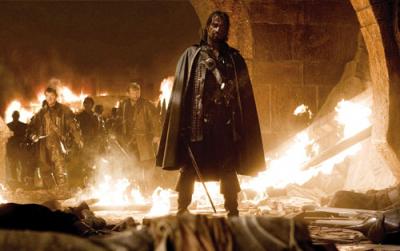
In true geekified graphic novel/comic book loving fashion, SOLOMON KANE is an E-ticket ride of fantasy and thrills that starts with a mesmerizing and striking visual palette carefully punctuated saturization of color, and then tosses in the hunky and hot James Purefoy as SOLOMON KANE himself. Opening in theatres this week, it’s mystifying how SOLOMON KANE could have been on a shelf for the past three years. I can only attribute the delay to some of the effects which at times appear slightly dated (but are still appropriate and effective for the material) in light of some of the tent-poles hitting the theatres of late, and possibly the fact that the backstory shown in the film strays from Robert E. Howard’s original stories, yet is ultimately structured so as to dovetail beautifully into potential sequels and the true storyline of Howard’s works.
SOLOMON KANE is not like any seafaring military man you’ve ever met. A captain for the British Army, we meet Kane while leading raids and military campaigns in 16th century Africa. With a real zeal for killing, Kane and his men are the best at what they do – perhaps even too good – as it leads them to an enemy unlike any they’ve ever faced – The Devil’s Reaper. And as it happens, the Reaper wants Kane’s soul.
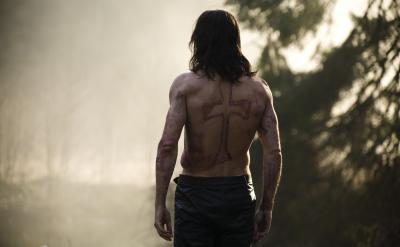
Not ready to part with his soul just yet, Kane escapes the Reaper, ready to turn over a new leaf, take stock in his life and make a drastic change so as to do good and not kill. Taking refuge in a monastery, Kane gives up his violent ways but after years of penance, is forced to leave. Seems he’s got some unfinished business in his past. As it turns out, Kane comes from royalty and wealth, but after a falling out with his father, left home and struck out on his own. If he is ever to find true contentment, it’s time to bury the hatchet, not to mention reclaim his legacy and wealth.
A lone weary traveler, Kane meets up the Crowthorn family who take him in, feed him, give him shelter as they make their own way across desolate – but violent – lands. And of course, while Kane may have denounced violence, it doesn’t mean that violence won’t find him, as it does when he and the Crowthorns are attacked by a “new world order” led by the demonic Malachi. With much of the family slain and their daughter Meredith taken captive, Kane must now re-evaluate his course in life and risk losing his soul to the Reaper as he attempts to save Meredith. But Fate has much worse things in store for Kane than just losing his soul.
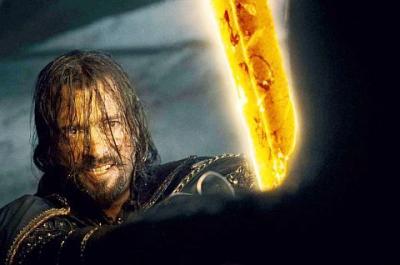
Given that SOLOMON KANE is about fantasy which always bodes excess, the performances are strong and at times, over-the-top with intensity, especially with Jason Flemyng, but this intensity is what makes SOLOMON KANE work. Still as captivating with the same regal sensibility he brought to “A Knight’s Tale” as Prince Edward, James Purefoy commands the screen. Embodying the physicality and emotional duality of SOLOMON KANE, Purefoy is an easy sell as a brooding, angry and conflicted champion. Never reaching for excess with the character of SOLOMON KANE, Purefoy remains grounded, human, a man’s man and a man to make women swoon. He even brings a sense of humility to Kane which shines during dialogue exchanges at the monastery set against a backdrop of pure, untouched snow covering the grounds. Shouldering the emotional burden of Kane, Purefoy employs his entire body through his cadence, walk and stance which, after Meredith’s capture and the killing of Mr. Crowthorn and his son, are with shoulders slumped, head down. Prior to that point, Kane strode with head up, long steps filled with confidence. Nice job by Purefoy in making SOLOMON KANE emotionally dimensionally. And did I mention how hot Purefoy is? (It’s worth repeating) Adding to his performance is the self-deprecating, offhanded delivery of some of the dialogue which bodes well for adding some humor into the mix.
As the kidnapped innocent, Meredith, Rachel Hurd-Wood just smolders when put together with Purefoy’s Kane. Cautious and curious, Hurd-Wood’s wide-eyed innocence draws you into the film, much as Meredith draws Kane.
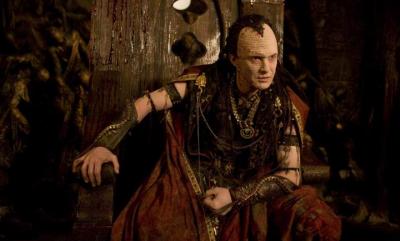
Jason Flemyng clearly relishes the deliciousness of being Malachi and pushes his performance over the top with sly decadence. Thanks to an imposing costume a la Mickey Rourke in “Immortals” or the masked Mummy in “The Mummy Returns”, one immediately thinks “formidable” as soon as Malachi appears on screen. As Crowthorn, Pete Postlethwaite brings the necessary morality and sense of purpose to the film and he milks his death scene for all it’s worth. Heart-wrenching performance comes courtesy of Max von Sydow as Josiah Kane. Chained, worn, tired and old, the imagery harkens to that of Richard Harris in “The Count of Monte Cristo” serving as a brilliantly crafted emotional touchstone.
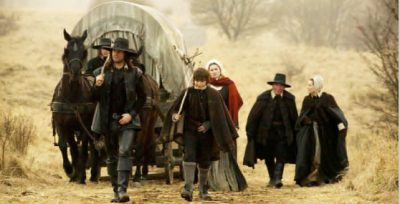
Written and directed by Michael J. Bassett based on Robert E. Howard’s characters, SOLOMON KANE is a plethora of moviemaking goodness. Slick, sleek and polished, with an opening panorama of a sea battle that moves into a land battle in a castle with the struggle between good and evil, the palette sucks you in. As polished as the purest mirror-image stainless steel, the look is so stunning and breathtaking with the intensity and heat by the use of golden umbers reflecting off the screen, Bassett shocks the senses as he jumps into the cold, grey drab of life for the common puritans of the day. Celebrating the use of rain and mud, flutters of snow are judiciously used in what appears to be more emotionally metaphoric for the character of SOLOMON KANE (i.e., purity, cleansing of the soul) as opposed to necessity for scenic ambience.
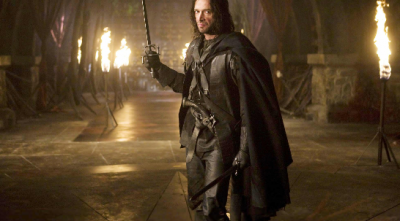
In creating the film we are flooded with visual reference to other films, among them – costuming from “Van Helsing” for SOLOMON KANE’s hat, cloak, leather, black; “The Mummy Returns” for the metal mask and hooded cape of the un-named minion of Malachi while Malachi’s chalky white face looks as if lifted from that of Prince Nuada in “Hellboy 2”; and of course, the village is, I believe, the same one used in shooting the Nic Cage-Ron Perlman vehicle, “Season of the Witch”. Imitation is the sincerest form of flattery and director Bassett has clearly made deliberate, open and obvious choices as his touchstones, in and of themselves, make SOLOMON KANE worth seeing.
The sword fights and battles are not only superbly executed, but then flawlessly lensed and edited. Again, judicious splattering of vibrant red blood adds visual texture to the muddied grey existence of the people.
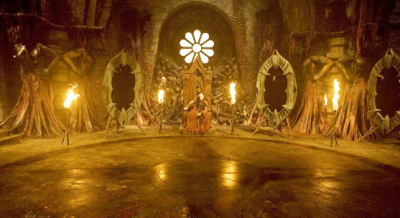
SOLOMON KANE is a visual winner, thanks to Dan Lausten’s amazing cinematography. Likewise, Andrew MacRitchie and his editing. Given his illustrious background editing James Bond films, “Alex Rider: Stormbreaker”, “Sahara”, even an Indiana Jones movie, action is clearly MacRitchie’s bailiwick and he doesn’t disappoint here. He knows how to keep the film moving and cut sequences to their best advantage.
Rickey Eyres’ production design is exemplary in creating the look and feel so necessary to this story and with his construction teams and artists behind him, give us a sold base for a glorious tonal bandwidth.
Particularly effective is the sweeping lushness of Klaus Badelt’s score.
A disappointment is an ending narrative epilogue that belies some of what preceded within the film proper, although it perfectly sets the stage for sequels.
On the shelf no more, the lesson to be learned with SOLOMON KANE is that sometimes studios, distributors and audiences need to take that leap of faith with the fantasy and fantastical conception of the project. They might be more than pleasantly surprised, as is the case here. SOLOMON KANE seduces with stunning visuals, sweeping swordplay and one sexy leading man.
Solomon Kane – James Purefoy
Josiah Kane – Max von Sydow
Malachi – Jason Flemyng
William Crowthorn – Pete Postlethwaite
Meredith Crowthorn – Rachel Hurd-Wood
Katherine Crowthorn – Alice Krige
Written and Directed by Michael J. Bassett based on character(s) by Robert E. Howard.












